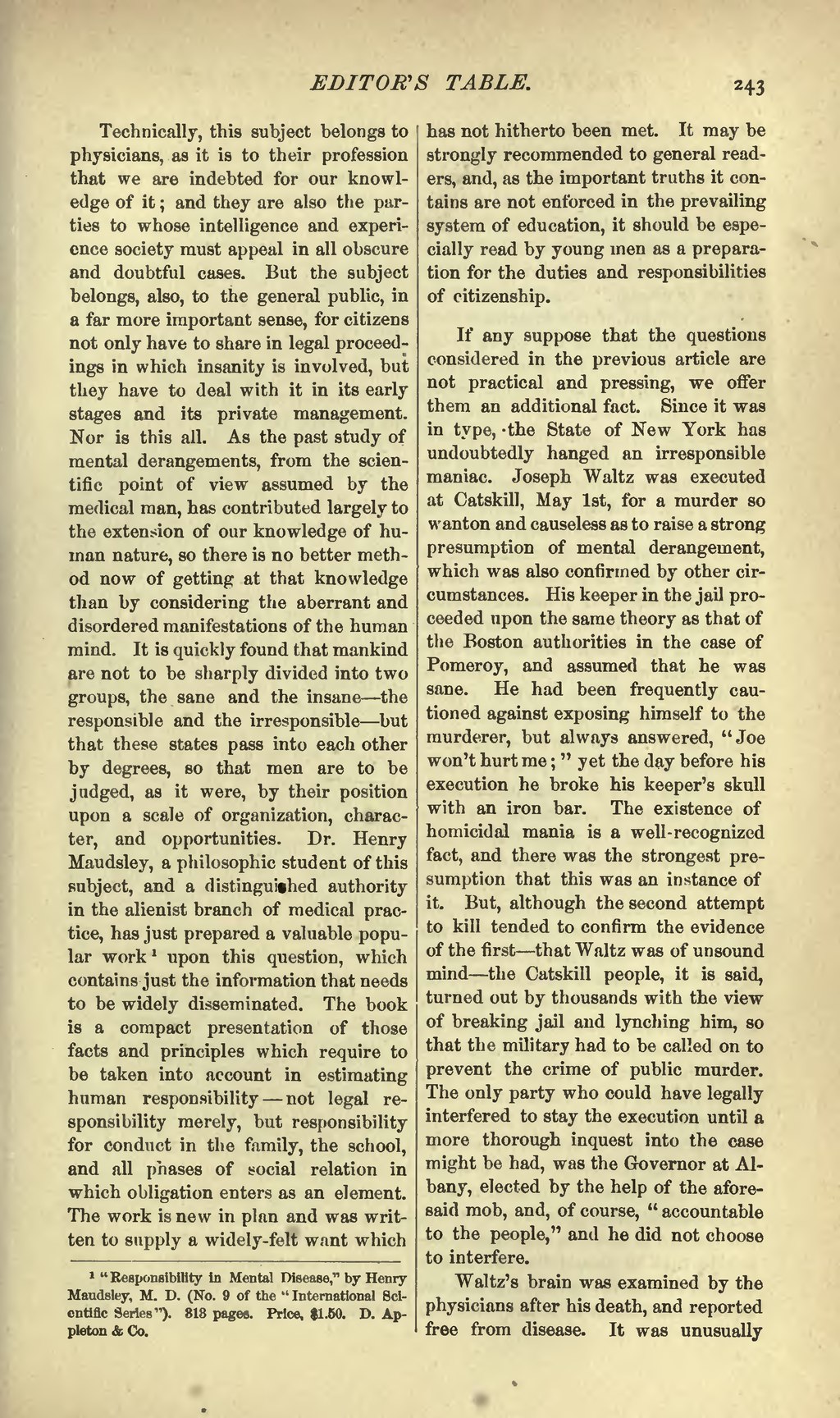Technically, this subject belongs to physicians, as it is to their profession that we are indebted for our knowledge of it; and they are also the parties to whose intelligence and experience society must appeal in all obscure and doubtful cases. But the subject belongs, also, to the general public, in a far more important sense, for citizens not only have to share in legal proceedings in which insanity is involved, but they have to deal with it in its early stages and its private management. Nor is this all. As the past study of mental derangements, from the scientific point of view assumed by the medical man, has contributed largely to the extension of our knowledge of human nature, so there is no better method now of getting at that knowledge than by considering the aberrant and disordered manifestations of the human mind. It is quickly found that mankind are not to be sharply divided into two groups, the sane and the insane—the responsible and the irresponsible—but that these states pass into each other by degrees, so that men are to be judged, as it were, by their position upon a scale of organization, character, and opportunities. Dr. Henry Maudsley, a philosophic student of this subject, and a distinguished authority in the alienist branch of medical practice, has just prepared a valuable popular work[1] upon this question, which contains just the information that needs to be widely disseminated. The book is a compact presentation of those facts and principles which require to be taken into account in estimating human responsibility—not legal responsibility merely, but responsibility for conduct in the family, the school, and all phases of social relation in which obligation enters as an element. The work is new in plan and was written to supply a widely-felt want which has not hitherto been met. It may be strongly recommended to general readers, and, as the important truths it contains are not enforced in the prevailing system of education, it should be especially read by young men as a preparation for the duties and responsibilities of citizenship.
If any suppose that the questions considered in the previous article are not practical and pressing, we offer them an additional fact. Since it was in type,-the State of New York has undoubtedly hanged an irresponsible maniac. Joseph Waltz was executed at Catskill, May 1st, for a murder so wanton and causeless as to raise a strong presumption of mental derangement, which was also confirmed by other circumstances. His keeper in the jail proceeded upon the same theory as that of the Boston authorities in the case of Pomeroy, and assumed that he was sane. He had been frequently cautioned against exposing himself to the murderer, but always answered, "Joe won't hurt me;" yet the day before his execution he broke his keeper's skull with an iron bar. The existence of homicidal mania is a well-recognized fact, and there was the strongest presumption that this was an instance of it. But, although the second attempt to kill tended to confirm the evidence of the first that—Waltz was of unsound mind—the Catskill people, it is said, turned out by thousands with the view of breaking jail and lynching him, so that the military had to be called on to prevent the crime of public murder. The only party who could have legally interfered to stay the execution until a more thorough inquest into the case might be had, was the Governor at Albany, elected by the help of the aforesaid mob, and, of course, "accountable to the people," and he did not choose to interfere.
Waltz's brain was examined by the physicians after his death, and reported free from disease. It was unusually
- ↑ "Responsibility in Mental Disease," by Henry Maudsley, M. D. (No. 9 of the "International Scientific Series"). 818 pages. Price, $1.50. D. Appleton & Co.

